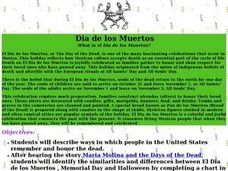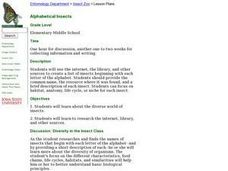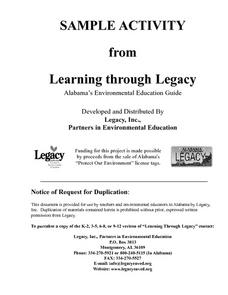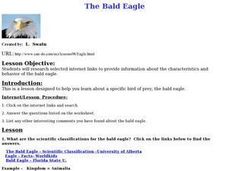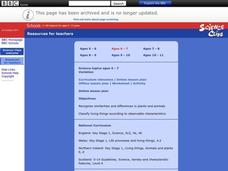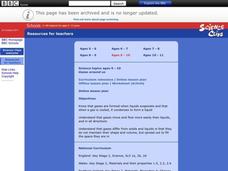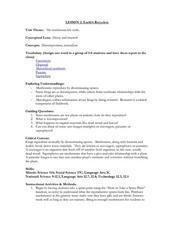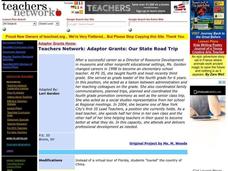Curated OER
Zoo Poo
Learners use Internet research to determine the amount of carbon dioxide produced per unit energy for biomass and coal. In this alternative energy lesson, students research to find out how much energy and carbon dioxide several coal and...
Curated OER
What is el Dia de los Muertos?
Students explore the Mexican celebration el Dia de los Muertos. In this Mexican celebration lesson, students discuss ways people in the US honor the dead. Students compare and contrast Mexican holidays and American holidays. Students...
Curated OER
Habitat Art: Florida Panthers
Young scholars discover the lifestyles of a Florida Panther by investigating its habitat. In this wild animal activity, students utilize the Internet to research the habits of a Panther and what their habitat is. Young scholars create...
Curated OER
Alphabetical Insects
Students research using the internet, the library, and other sources to create a list of insects beginning with each letter of the alphabet. They provide the common name, the resource where it was found, and a brief description of each...
Curated OER
Posters and People
Students create and design posters reflecting the types of litter harmful to aquatic wildlife. They explain the dangers of fishing line to aquatic wildlife, plastic bags to dolphins, and fish nets to fish. They design a poster to...
Curated OER
The Bald Eagle
Students research selected Internet links to provide information about the characteristics and behavior of the bald eagle.
Curated OER
Language Arts: Five Senses Walk
First graders take a discovery walk around the school. They use their observations to compose a class book about their school.
Curated OER
Insects
Students work in groups to investigate the concept of insects. They participate in a variety of activities that include the gathering of samples and making observations like identifying different body parts. The lesson plan integrates...
Curated OER
Adventures in Microworld
Fifth graders journey through Microworld where they and their partner create a report on the symptons of their friend's disease, the cause of disease (virus or baceterium), the scientific name for the disease and how the disease is...
Curated OER
Valley of the Butterflies
First graders explore why butterfly populations in Idaho's Lapwai Valley have decreased.
Curated OER
Worms in a Bottle
Young scholars gain a better understanding of the worm and its role in the recycling of organic materials into simpler forms by constructing worm bottles and observing for 60 to 90 days.
Curated OER
Ourselves
Students use a website to name and compare external body parts of humans and other animals.
Curated OER
Sound and Hearing - Internet Research
Students use a website to help them recognize that sound is generated in a variety of ways and from different sources. They determine that sounds vary in tone and loudness, and learn there are different ways to describe sound.
Curated OER
Circuits and Conductors
Young scholars participate in an online lesson to explain the conductivity of different materials and the effect of changing the power source.
Curated OER
Variation
Students participate in an online lesson to reinforce the similarities and differences in plants and animals. They classify living things according to observable characteristics.
Curated OER
Gases Around Us
Learners participate in an online lesson showing that gases are formed when liquids evaporate and that when a gas is cooled, it condenses to form a liquid, and gases move and flow more easily than liquids, and how gases differ from solids.
Curated OER
Changing State
Students participate in an online lesson plan to investigate the effects of cooling and heating on water.
Curated OER
Forces in Action
Learners ask questions that can be investigated scientifically. They determine how to plan a fair test by changing one factor while keeping other factors the same, to use measurements to draw conclusions and use scientific knowledge to...
Curated OER
Changing Circuits
Students participate in an online lesson to explain how to make bulbs brighter or dimmer in a series circuit by changing the number or type of components.
Curated OER
Earth's Recyclers
Students work together in groups to report on different topics related to decomposition. They answer questions and share their answers with the class. They discuss any topic that is unclear.
Curated OER
Migration Isn't Just For The Birds
Fourth graders explore the concepts of conservation using a reading story that describes a flock of geese. The ecosystems are also described in the lesson and the effects of pollution.
Curated OER
Cotton and Cabbage
Learners note how given traits could be achieved by selective breeding and by transgenesis. They identify different uses of GEO. Students recognize that the use of letters (Bt) before an organism's name means that the organism has had a...
Curated OER
Got Biodiversity?
Learners examine the concept of biodiversity. Using the internet, they complete small activities in which they work together. Using the information they collected, they create a class book, make murals and write in their journals.
Curated OER
Our State Road Trip
Students take a virtual tour of the country of China instead of a state. Using the Internet, they examine the differences between a political and physical map and use latitude and longitude to locate specific places. They also research...
Other popular searches
- Butterfly Life Cycle
- Frog Life Cycle
- Fish Life Cycle
- Life Cycle of Frogs
- Life Cycle of Stars
- Life Cycle of a Butterfly
- Animal Life Cycles
- Frog Life Cycle Worksheet
- Family Life Cycle
- Pumpkin Life Cycle
- Butterfly Life Cycle Video
- Life Cycle Chicken Embryo



